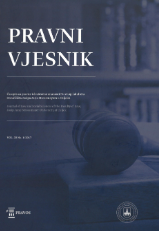21ST CENTURY WILLS
21ST CENTURY WILLS
Author(s): Dubravka KlasičekSubject(s): Law, Constitution, Jurisprudence, Civil Law, Transformation Period (1990 - 2010), Present Times (2010 - today), ICT Information and Communications Technologies
Published by: Pravni fakultet Sveučilišta Josipa Jurja Strossmayera u Osijeku
Keywords: digital wills; electronic wills; digital technology; testamentary intent; formalism; in favorem testamenti;
Summary/Abstract: Wills are formal legal affairs that must satisfy strict prerequisites in order to be valid. Otherwise, they will be either automatically null or voidable. The rules pertaining to the form of wills have always been strict and have required wills to be made in a certain way. It is said that the amplified formalism promotes testamentary intent, ensures reliable evidence of testator’s wishes and reinforces the gravity of testation. However, it seems that, as of late, formalism sometimes clashes with the real intent of the decedent. Some countries have already adopted rules that allow judges to consider documents that do not meet all of the formal requirements needed for wills, to be valid and have effect. By doing so, they have opened the door to creation of certain new types of wills, made with the help of digital technology, that have never existed before – i.e. wills created with the help of smartphones, cameras or computers. Wills made with the help of digital technology are extremely informal but nonetheless; they purport testamentary intentions of the people who made them. These wills would not have any effect in most countries, however, in some, they can be declared valid, under certain conditions. This paper deals with a number of such examples and implications of abandoning strict formalism concerning the form of wills.
- Issue Year: 35/2019
- Issue No: 2
- Page Range: 29-48
- Page Count: 20
- Language: English

